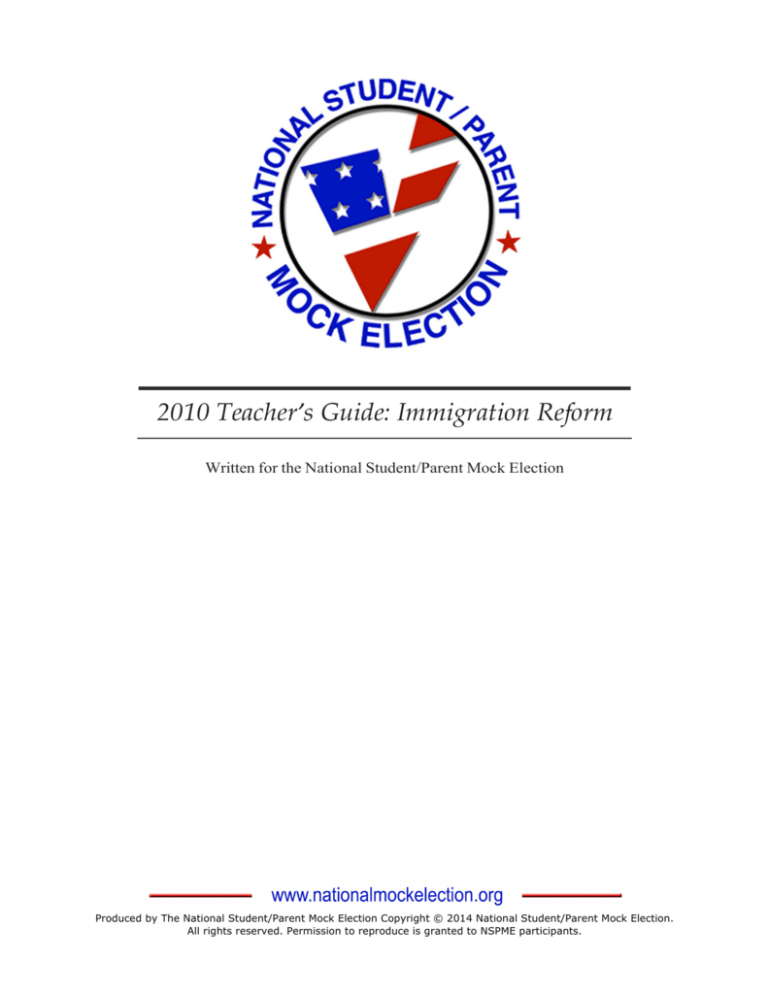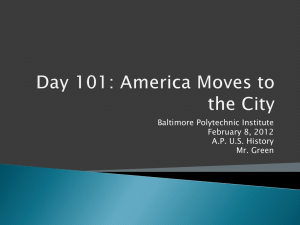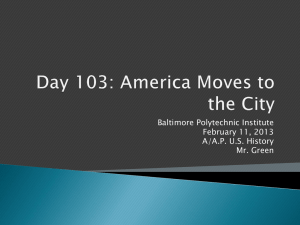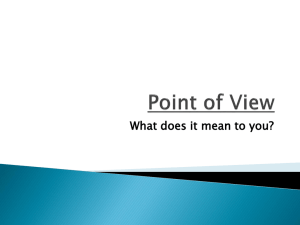
2010 Teacher’s Guide: Immigration Reform Written for the National Student/Parent Mock Election
Produced by The National Student/Parent Mock Election Copyright © 2014 National Student/Parent Mock Election.
All rights reserved. Permission to reproduce is granted to NSPME participants.
2010 Elections -- Teacher's Guide to Immigration Reform
as an Election Issue Section 1 -- Introduction:
"Before I built a wall I'd ask to know
What I was walling in or walling out,
And to whom I was like to give offence.
Something there is that doesn't love a wall,
That wants it down."
Mending Wall -- Robert Frost
The United States is a nation of immigrants and their descendants; American Indians and Alaska
Natives are less than 2% of the population. We have regulated immigration for over a hundred years,
but there are still problems. Immigration reform is a political issue that has not been resolved in more
than ten years of effort through several administrations. There seems to be no room for compromise by
those with polarized positions; they can't even agree on the terminology. What one side calls
legalization the other calls amnesty; what one sees as compassion the other sees as a security threat.
Some propose comprehensive reform; others want to address specific issues like border control or
education. Emotions often get more attention than costs and practicality. How do we solve the
problems?
Despite recently shrinking numbers, there are over 11 million illegal immigrants in the U.S., and there is
no way to arrest and deport them all; we don't have the enforcement personnel, budgets, courts, jails,
etc. The U.S. land borders are over 7000 miles; we also have over 88,000 miles of tidal shoreline for
the states alone, not counting territories, etc., and almost 20,000 airports. Controlling every part of our
borders all the time is not possible, and as soon as controls in one area are increased, others have
more problems. How do we increase border security without building a containment dome around the
country?
Should enforcement efforts target specific groups of illegal aliens like criminals or workers in particular
jobs? Should there be more severe penalties for employers of illegal aliens? How do we accomplish
any of this without trampling on the constitutional rights of citizens and legal residents?
If we take the time to thoroughly examine every vessel, plane, vehicle, cargo container, etc. entering
our country, the economy will be crippled by the delays. How do we avoid creating more problems with
any solutions? What answers are the candidates proposing?
Section 2 -- Topics for discussion, research, and activities:
NOTE: For more information and suggestions, see the National Student/Parent Mock Election Issues
Forum for the 2006 Election at:
http://www.nationalmockelection.org/docs/curriculum_issues_forum_2006.pdf
Why is immigration reform a hot issue in this election? See the following articles:
http://en.wikipedia.org/wiki/Immigration_reform
http://voices.washingtonpost.com/ezra-klein/2010/04/like_it_or_not_the_2010_electi.html
Like it or not, the 2010 election is now (substantially) about immigration
http://www.politico.com/news/stories/0810/41037.html
Poll: Surprising demand for immigration
reform
Survey your class, school, teachers, parents, etc. to determine their views and why they hold them.
How do they compare with the positions of the Democratic and Republican Parties? Are positions on
immigration reform primary or lesser concerns in their choice of candidates? How do these positions
relate to their economic conditions or ethnicity?
The current debate is not the first time immigration has been a hot topic in the U.S. The American Party
of the 1840s and 1850s (the Know-Nothings) maintained that we were being invaded by German and
Irish immigrants.
See: http://en.wikipedia.org/wiki/Know_Nothing
For a variety of reasons, many of its members joined the Republican Party when it was formed in 1854.
Compare the situation of 150 years ago with today. What has changed? What problems and emotions
remain? How much is based on fact and how much on political expediency? Were (and are) the
problems cited cause by the immigrants, or were (are) they scapegoats for larger economic and social
problems?
What reasons for and against immigration reform are being used today? Are there similar arguments
and counter arguments in other countries? Are the reasons that are given serious problems?
See: http://en.wikipedia.org/wiki/Opposition_to_immigration
For the first time in our nation’s history, there will be more minority than white children born in the next
decade. Can the Republican Party afford to risk losing the Latino vote under these circumstances?
What do Republican leaders hope to gain in 2010? What do Democratic leaders?
In the United Kingdom, the Liberal Democrats have proposed “regularizing” illegal immigrants who have
lived in the country for at least 10 years and who do not have a criminal record. Police would then
concentrate on people traffickers and criminals – and raise billions in tax revenue. Deporting the others
would cost billions and take 30 years.
Given the opportunity to raise billions, why hasn’t the Liberal Democrats’ plan moved forward? Do
current economic conditions in the UK and USA provide opportunities for immigration reform that have
not been present for years? How do we reconcile the rhetoric with reality, and the opportunity with
politics?
See: http://articles.latimes.com/2010/sep/03/opinion/la-ed-immigrants-20100903
What specific proposals for immigration reform are being considered now? Here are some topics for
research, discussion, role-playing, etc. You may wish to have groups draft legislation containing their
ideas, and then attempt to compromise to get a majority or supermajority vote.
Should we increase border controls or prosecute employers of illegal immigrants? Should skilled
workers be given priority over family members? Should they be limited to a specific job (H1B visas,
etc.) or should the market decide?
Should we pass a constitutional amendment to prevent the children of illegal immigrants from acquiring
citizenship?
See: http://www.google.com/hostednews/ap/article/ALeqM5ioCZswZcLXmPTkToJLczly2vsQwD9I0MSL01
http://abcnews.go.com/Politics/birth-tourism-industry-markets-us-citizenship-abroad/story?id=10359956
Should immigrants who came here as children and know no other country be given a path to
citizenship? See: http://en.wikipedia.org/wiki/Dream_Act
Should illegal immigrants be permitted to attend college at the same prices as legal residents? Is their
education a cost or benefit to society?
If illegal immigrants are provided with methods of legalizing their status, does this penalize those who
are trying to enter the country legally, or simply recognize the reality of a difficult situation?
How should our immigration laws give preferences to specific nationalities, skills, ethnicities, hardships,
relatives, etc.?
Illegal immigrants are entitled to public education through high school and to constitutional protections,
but not necessarily to driver's licenses, insurance, health care, etc. How does this impact our society?
Immigration control is pre-empted by federal law, as the recent Arizona experience has shown. Should
this change?
Some people want to limit the use of languages other than English in the U.S. Is this reasonable or
practical? Would immigrants be more likely to learn English if it is compulsory? What about other
American languages like Navajo or Cherokee?
The Statue of Liberty beckons to the "huddled masses yearning to breathe free." Have we
accommodated enough masses, rendering it obsolete? How many generations of your family have
been in the US? Why didn't the last one in shut the door? What now?
Section 3 -- Sources of further inform ation:
Democratic immigration reform policy:
http://www.democrats.org/a/national/american_community/immigration/
http://www.ontheissues.org/celeb/Democratic_Party_Immigration.htm
Republican immigration reform policy:
http://www.gop.com/2008Platform/NationalSecurity.htm - Def5
http://www.ontheissues.org/celeb/Republican_Party_Immigration.htm
Other viewpoints:
http://www.fairus.org/ "Working to help the American public convince Congress that United States
immigration must be reduced."
http://reformimmigrationforamerica.org/ "Our vision of reform includes immigrants and native-born U.S.
citizens working shoulder to shoulder to achieve better wages, working conditions, and labor
protections—making sure everyone is playing by the same set of rules...."
Lesson Plans:
http://www.pbs.org/independentlens/newamericans/foreducators_index.html
PBS lesson plans for The New Americans for grades 7-12
http://www.pbs.org/newshour/extra/teachers/lessonplans/socialstudies/immigration_reform.html
Lesson Plan: Immigration Reform.
http://www.itvs.org/educators/collections/sentenced-home
"ITVS Community Classroom lesson plans pair educational film modules drawn from ITVS’s acclaimed
documentary films with standards-based lesson plans, activities, and other interactive content."
http://www.annenbergclassroom.org/Downloads/LessonPlans/modernimmigrationlessonplan.pdf
Modern Immigration Debates (PDF file)








